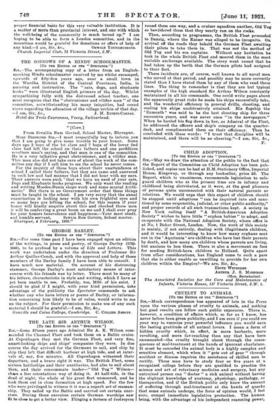THE LATE SIR ARTHUR WILSON.
(To THE EDITOR or THE " SPECTATOR."] Sin,—Some fifteen years ago Admiral Sir A. K. Wilson com- manded the Channel Fleet- and took them on a Baltic cruise. At Copenhagen they met the German Fleet, and very fine, smart-looking ships and ships' companies they were. In due course the day arrived for the Germans to sail, and ship by ship they left that difficult harbour at high tide, and at inter- vals of, say, five minutes. All Copenhagen witnessed their departure, and a brave sight it was. The British Fleet, some sixteen battleships and their auxiliaries, had also to sail about then, and their consummate leader—" Old Tug " Wilson— chase a less ostentatious way of doing it. At half-tide, in the dead of night, the whole of his great fleet unmoored, and he took them out in close formation at high speed. For the few who were privileged to witness it it was a superb act of seaman- ship. They sailed up the Baltic and carried out certain exer- cises. During those exercises certain German warships saw St to close to get a better view. Flinging a festoon of destroyers round them one way, and a cruiser squadron another. Old Tug so bewildered them that they nearly ran on the rocks.
Then, according to programme, the British Fleet proceeded to Danzig, where the Kaiser was alleged to be incognito. On arrival off the roads they beheld the German Fleet awaiting their pilots to take them in. That was not the method of Old Tug and his sea captains. Without any hesitation he took in the whole British Fleet and moored them in the most suitable anchorage available. The story went round that he had taken up the berth that the German pilots had assigned to their fleet.
These incidents are, of course, -well known to all naval men who served at that period, and possibly may be more correctly stated than I have stated them by any of them who read these lines. The thing to remember is that they are but typical examples of the high standard Sir Arthur Wilson constantly maintained in all his commands. One could write pages about the apparently great risks he made his ships successfully take, and the wonderful efficiency in general drills, shooting, and coaling his ships unobtrusively attained. His flagship the `Exmouth' was said to be the best shooting ship for three successive years, and was never once "in the newspapers." When he hauled his flag down in her, as Admiral of the Fleet,
he addressed the officers and ship's company on the quarter. deck, and complimented them on their efficiency. Then he concluded with these words: "I trust that discipline will be maintained, and there will be no cheering."—I am, Sir, &c., F.


































 Previous page
Previous page